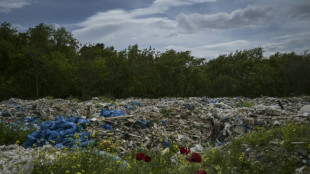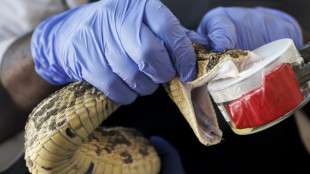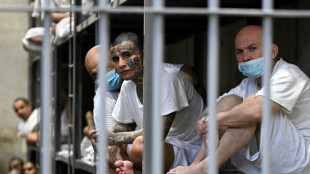
-
 Mounds of waste dumped near Athens's main river: NGO
Mounds of waste dumped near Athens's main river: NGO
-
Spain starts probing causes of massive blackout

-
 France targets cheap Chinese goods with fee on packages
France targets cheap Chinese goods with fee on packages
-
Amnesty accuses Israel of 'live-streamed genocide' in Gaza

-
 Japan, Philippines leaders vow to deepen security ties
Japan, Philippines leaders vow to deepen security ties
-
AstraZeneca moves some production to US amid tariff threat

-
 Shadman's ton gives Bangladesh lead in 2nd Zimbabwe Test
Shadman's ton gives Bangladesh lead in 2nd Zimbabwe Test
-
Barca's Yamal: I admire Messi but don't compare myself to him

-
 Pfizer profits dip on lower Paxlovid sales
Pfizer profits dip on lower Paxlovid sales
-
French right-wing TV host fans talk of presidential bid

-
 Two men in court charged with 'moronic' felling of famed UK tree
Two men in court charged with 'moronic' felling of famed UK tree
-
Amnesty accuses Israel of 'live-streamed genocide' against Gazans

-
 Spotify posts record profit in first quarter
Spotify posts record profit in first quarter
-
Sciver-Brunt named as England women's cricket captain

-
 GM profits top estimates, but automaker reviewing outlook due to tariffs
GM profits top estimates, but automaker reviewing outlook due to tariffs
-
Stock markets edge up as Trump softens tariff pain for auto firms

-
 Pricier trainers? Adidas warns on US tariff impact
Pricier trainers? Adidas warns on US tariff impact
-
Spain, Portugal rule out cyberattack for massive blackout

-
 Suryavanshi, 14, dubbed India's next superstar after shattering records
Suryavanshi, 14, dubbed India's next superstar after shattering records
-
Power back in Spain, Portugal after massive blackout

-
 Pakistan says it shot down Indian drone along Kashmir border
Pakistan says it shot down Indian drone along Kashmir border
-
Cardinals run the media gauntlet ahead of conclave

-
 BP profit drops 70% amid pivot back to oil and gas
BP profit drops 70% amid pivot back to oil and gas
-
Iran says fire contained after deadly blast at key port

-
 Irish rappers Kneecap deny support for Hamas, Hezbollah
Irish rappers Kneecap deny support for Hamas, Hezbollah
-
Blackout plunges Spain into chaotic night of darkness

-
 Convicted cardinal confirms he will sit out conclave
Convicted cardinal confirms he will sit out conclave
-
Kashmiris fortify bunkers anticipating India-Pakistan crossfire

-
 Adidas warns US tariffs to push up prices
Adidas warns US tariffs to push up prices
-
Markets boosted as Trump softens tariff pain for auto firms

-
 Suryavanshi, 14, dubbed 'next superstar' after batting records tumble
Suryavanshi, 14, dubbed 'next superstar' after batting records tumble
-
Australian doubles player Purcell accepts 18-month doping ban

-
 Kashmir attack unites political foes in India, Pakistan
Kashmir attack unites political foes in India, Pakistan
-
Croatia hotel toasts dizzying century of stars, sovereigns and champagne

-
 Kenya's desperate need for more snake antivenom
Kenya's desperate need for more snake antivenom
-
Les Kiss in frame with Wallabies set to name new coach

-
 Cavaliers scorch Heat, Warriors down Rockets in thriller
Cavaliers scorch Heat, Warriors down Rockets in thriller
-
Opposition wins Trinidad and Tobago election, returning Persad-Bissessar as PM

-
 Study sheds light on origin of Australia's odd echidna
Study sheds light on origin of Australia's odd echidna
-
France tries Syrian Islamist rebel ex-spokesman on war crime charges

-
 Trump boasts of 'fun' 100 days, but Americans disenchanted
Trump boasts of 'fun' 100 days, but Americans disenchanted
-
Elitist no more, caviar is turning casual

-
 Amnesty accuses Israel of 'live-streamed genocide' against Gaza Palestinians
Amnesty accuses Israel of 'live-streamed genocide' against Gaza Palestinians
-
Inter slump puts season at risk ahead of daunting Barca trip

-
 Power returns to most of Spain, Portugal after massive blackout
Power returns to most of Spain, Portugal after massive blackout
-
'I have hope': Vietnam Babylift survivor's search for birth mother

-
 US climate assessment thrown into doubt as Trump dismisses authors
US climate assessment thrown into doubt as Trump dismisses authors
-
Venezuelan president slams US over little girl's 'abduction'

-
 Hard-right upstarts eye big gains in local UK polls
Hard-right upstarts eye big gains in local UK polls
-
Skulls, smoke and spirits: Thai ceremony for the unclaimed dead


A whiff of tears reduces male aggression, says study
Watching someone cry often evokes an emotional response -- but according to a new study published Thursday, human tears themselves contain a chemical signal that reduces brain activity linked to aggression.
The research was carried out by the Weizmann Institute of Science, Israel, and appeared in PLOS Biology, a US science journal. Though it involved female tears, because women made themselves available as donors, it probably isn't a sex-dependent effect, the authors say.
Numerous studies have shown rodent tears contain chemicals serving as social signals they emit on demand -- female mice tears for example reduce fighting among males; and subordinate male mole rats smear themselves in their own tears so that dominant males attack them less.
To find out whether similar effects occurred in humans, a team led by PhD student Shani Agron first exposed 25 male volunteers to either "emotional" tears, or to saline. The volunteers couldn't tell what they were sniffing as both substances are clear and odorless.
The tears were obtained from six female volunteers who watched sad films in isolation and used a mirror to capture the liquid in a vial as it trickled down their cheeks.
"When we looked for volunteers who could donate tears, we found mostly women, because for them it's much more socially acceptable to cry," said Agron in a statement.
She added that since prior research had shown tears reduce testosterone levels in men, and that lowering testosterone has a greater effect on aggression in men than in women, "we began by studying the impact of tears on men because this gave us higher chances of seeing an effect."
They had the volunteers play a computer game that had been well established in prior aggression studies, and involves accumulating money while a fictitious opponent could steal their earnings.
Given the opportunity, the men could get revenge on the other player by causing them to lose money, even though in their own case they would not gain from the opponent's loss.
Such revenge-seeking, aggressive behavior in the game dropped 43.7 percent after men sniffed the tears.
This appeared to mirror what had been observed in rodents, but unlike rodents, humans don't have a structure in their noses called a vomeronasal organ, which was lost during our species' evolution and detects odorless chemical signals.
To find out what was going on, the researchers applied the tears to 62 olfactory receptors in a lab dish and found that four receptors were activated by tears, but not saline.
Finally, the scientists repeated the experiments with the men's brains connected to MRI scanners.
The imaging revealed the prefrontal cortex and anterior insula, which are related to aggression, became more active when men were provoked during the game, but the effect was not as strong if they had sniffed tears.
"We note that crying often occurs in very close-range interactions, to the extent that 'kissing teary cheeks' is a recurring theme across cultures," wrote the authors, adding that emitting chemical signals to prevent aggression was probably even more important among infants, where verbal communication isn't possible.
O.Karlsson--AMWN


